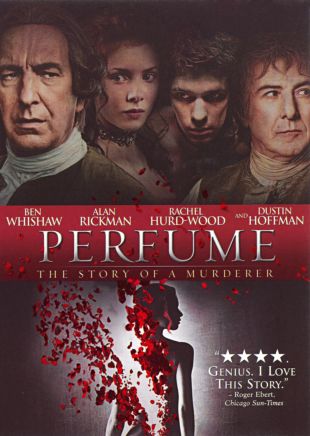
Releasing a costume epic in the thick of Oscar season is a calculated risk -- it can pay big dividends in terms of prestige-by-proximity, but if it doesn't get marketed as an outside-the-box genre buster, it'll just get buried. This was the unfortunate fate of Perfume: The Story of a Murderer, which should have also gotten more attention because it came from Tom Tykwer, the writer/director of the enthralling Run Lola Run. Remarkably, Perfume is an equally original work. Simply put, when was the last time you saw a film about the sense of smell? It would seem a cinematic mismatch, but Tykwer uses every narrative gift at his disposal to give a deeply rich and palpable visualization to the olfactory themes. When Dustin Hoffman's perfumer uncorks the divine scent spontaneously conjured by his apprentice, Jean-Baptiste Grenouille (Ben Whishaw), his laboratory morphs into a lush digital garden for the time the scent lingers in the air. Perfume is peppered with such inspired methods of communicating smells, both delicious and repugnant, and their potential to overwhelm. As if tackling this overlooked sense weren't enough, Tykwer also may be the first filmmaker to delve into the mysterious art of making perfume. That gets its procedural day in the sun through another set of fascinating sequences. But what may be most impressive about Tykwer's film is that it is so different from anything he's ever made. Run Lola Run showcased one kind of brilliance, but here, Tykwer nearly eschews Lola's jittery aesthetic in favor of a grand period opulence that's languidly paced and deliberate. One wouldn't even know it was the same director but for the rare signature touch. (And it's worth noting, when praising Tykwer, that he and collaborators Reinhold Heil and Johnny Klimek composed this film's period-appropriate music, just as they composed Lola's techno soundtrack.)
With gorgeous cinematography by Frank Griebe and a trio of art directors working overtime, the alternating grubbiness and glamour of 18th century France pops off the screen, from the fish-strewn marketplaces of Paris to the palatial mansions of Grasse. Some viewers may have a hard time adjusting to Hoffman in a powdered wig, and he does sometimes distract, though his role is relatively minor (as is that of the always good Alan Rickman). But Whishaw makes a profoundly unknowable protagonist -- a loner orphan gifted with a supernatural sense of smell, who uses killing merely as a means of attempting to bottle the perfect scent. Tykwer makes grand gestures in this film, most notably the brilliantly executed climax and its jaw-dropping use of extras. Those who frowned on Perfume may have attacked scenes like this one, which go over the top in adhering to the film's status as a dark fairy tale that knows it couldn't really exist. But anyone who appreciates errors of ambition will surely forgive Tykwer, especially once they get swept up in his spell of smell.
